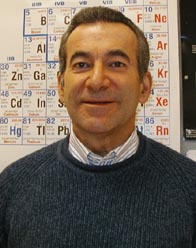Courses
CHEMISTRy
Preparing Students for Advanced Placement Chemistry
This course is for both NEW and EXPERIENCED chemistry teachers who can expect an extensive look at the redesigned chemistry course outlined in the AP Chemistry Curriculum Framework. Curriculum Framework activities will explore the revised curriculum requirements and introduce the experiences of guided inquiry in labs and the classroom.
The focus of this course includes:
Time and guidance will be provided for collaboration and practice with the above topics. Opportunities will be provided to share strategies for incorporating more inquiry in both the lab and the classroom. Each teacher will bring materials to share for major content or problem areas (i.e. equilibrium, buffers, electrochemistry, IMFs), such as notes, labs, exams, formative assessments, suggestions for refining and adopting different approaches. There will be one to two hours of homework daily.
AGENDA
Tuesday
- Welcome and Introductions
- Overview of the Institute, Texts, College Board Resource materials
- Prerequisites, Screening students, Aptitude test, The Role of Guidance, Equity and Access
- Exploring the AP Chemistry Curriculum Framework, Science Practices
- Developing a Syllabus
- Reflection and debriefing of classroom experiences after teaching the redesigned course
- Assignments: Presentation and Discussion of the assigned multiple choice questions and the free response from the most recent AP Exam
- Guided Inquiry Lab
- Lab debriefings
- Best Practices: Sharing of materials from major content or problem areas (i.e. equilibrium, buffers, electrochemistry, IMFs), such as notes, labs, exams, formative assessments, suggestions for refining and adopting different approaches.
Wednesday
- Setting up a Successful Course in AP Chemistry
- Successful strategies for teaching the new content areas: photoelectron spectroscopy
- Reflection and debriefing of lab experiences after teaching the redesigned course
- Assignments: Presentation and Discussion of the most recent AP Exam including a Mock Grading exercise
- Guided Inquiry Lab
- Lab debriefings
- Use of statistics in lab data analysis
- Use of graphing calculators
- Best Practices: Continuation of sharing of materials from major content or problem areas
Thursday
- Incorporating successful inquiry labs
- Converting traditional to inquiry labs
- Converting items from released AP exams into the new type of question format
- Analyzing test data
- Score distributions
- Instructional Design and Assessment
- Assignments: Presentation and Discussion of the most recent AP Exam
- Guided Inquiry Lab
- Lab debriefings
- Best Practices: Continuation of sharing of materials from major content or problem areas
Friday
- Inquiry in the classroom
- Assignments: Presentation and Discussion of the most recent AP Exam
- Presentation of Useful Chemistry Websites
- Scoring the AP exam
- AP Report to teachers
- What to do after the Exam
- Lab debriefings and cleanup
- Final Participant Sharing Session
Participants are asked to bring the following:
- Your school ID Badge to wear during all sessions
- A TI 83 or TI 84 calculator
- A Laptop or notebook
- A flash drive with your favorite Chemistry activity, experiment, or teaching activity to share with other participants. (Alternatively, bring 25-30 hard copies)
- A Chemistry website which you have found to be useful in your classroom. (Email the URL to me with a short annotation; It will be added to a shared website.)

“Lots of sharing of ideas and best practices. Exceeded my expectations.”
–Past Client
Instructor: JOHN HNATOW
John Hnatow taught chemistry for 36 years at Emmaus High School in the East Penn School District in Emmaus, PA, where he was also chairperson of the science department. John is an experienced AP Chemistry and Pre-AP science consultant, a chemistry workshop leader, an AP exam reader, table and question leader, and is currently serving a second term on the AP Chemistry Development Committee. He is co-chair of the AP Chemistry Redesign Committee, a College Board Advisor, and has been a member of the College Board's Science Academic Advisory Committee. John is a mentor teacher for the New Orleans public and charter schools and has presented Saturday sessions for both the National Mathematics and Science Initiative (NMSI) program and the REACH program. He is also a Dreyfus master teacher and was team leader of the WWNFF CHEM4 Chemistry team, with whom he presented over 27 weeklong TORCH institutes for chemistry teachers throughout the country. He has presented numerous topics at ACS meetings, Chem Ed conferences, and performed demonstrations in the Flinn-sponsored "An Incredible Evening of Chemistry"ť at an NSTA meeting in Boston. His notable national awards include the Discovery Center Science Teacher Hall of Fame Inductee, the CMA Catalyst Award, the Tandy Technology Scholars Award, and the Presidential Award for Excellence in Science Teaching.